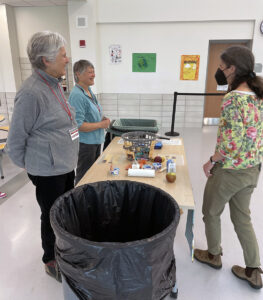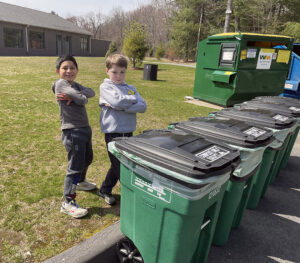This spring, the Lincoln School launched a school-wide food composting program. The Lincoln School Foundation sponsored the pilot program, working with second-grade teacher Nicole McDonagh, Principal Sarah Collmer, and many others to create a greener future for the school and the town.

Diana Smith, Belinda Gingrich, and Emily Haslett were among the volunteers who helped launch the Lincoln School composting program.
Over a period of four weeks, volunteers in a total of 72 slots (two adults per lunch hour) went to work. After participating in an informational session and reviewing an instructional slide deck, they guided students as they dumped organic matter, trays, and other items into either compost or trash. Unopened, non-refrigerated food items that meet the official guidelines for food sharing are donated to the local food pantry. Students and staff move the compost binds to a holding location, where Black Earth Composting picks them up weekly.
The school will receive some composted soil that will be used in raised beds that the Lincoln Garden Club is funding. The club’s Diana Rice-Sheahan will be responsible for planting and maintaining the beds for two years, after which Lincoln Common Ground and other volunteer groups will continue.
The composting program also has the benefit of showing what students are consuming, which can inform menu choices and help minimize food waste and spending. Studies have shown that American school cafeterias waste more food (especially fruits and vegetables) than those in other developed countries.
One of the volunteers who helped with the program’s rollout was Select Board Chair Kim Bodnar. “The lessons it shares with students around environmental sustainability and waste reduction are important, and it’s something that brings the Lincoln School community together with the broader community.”
In addition to the LSF, Garden Club, and Select Board, members of the School Committee, PTO core team, METCO Coordinating Committee, First Parish Church, Friends of Modern Architecture, Friends of Lincoln Public Library, the Council on Aging & Human Services pitched in to make the composting program possible.

Excellent program!
A telling comment on the American diet that more fruits and vegetable than other foods are wasted in school cafeteria lunches …
Happy to hear about this and the involvement of so many. Lincoln Girl Scouts actually pioneered a pilot effort 14 years ago (to the month) for Troop 2883’s Bronze Award. A letter from the Lincoln School administration to Girl Scouts of Eastern Massachusetts summarized: “The 5th grade troop saw an opportunity to introduce composting into our lunch program. They built a composting bin outside of the school and took responsibility for teaching students about the importance of composting as well as getting the compost from each lunch period to the bin.” It is great that there is now increased awareness and more detailed systems in place to make this a continued part of the Lincoln School. Great job! I’m also proud of our trailblazing Girl Scouts.
I also love that “Unopened, non-refrigerated food items that meet the official guidelines for food sharing are donated to the local food pantry.” Yay to reducing food waste!
Bravo to the Lincoln Girls Scouts of 2010, the Lincoln Schools of 2024, Black Earth Composting, and Lincoln’s adult volunteers for bringing those early composting initiatives into common practice!